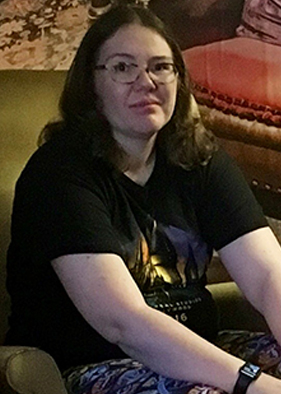September 2018, Year X, no. 9
Rebecca Sharrock
The young lady made of memories
“Initially I didn’t feel like I had any form of advanced memory. I assumed that every person could remember their entire life, and I didn’t know that HSAM even existed until I was 21 years old in 2011.”
Telos: What does Highly Superior Autobiographical Memory (HSAM) mean?
Rebecca Sharrock: Highly Superior Autobiographical Memory (HSAM) is a very rare condition discovered in the year 2006 by researchers from the University California, Irvine. It enables a person to both remember and easily retrieve all or most of their past in precise detail. HSAM was formally known as hyperthymesia; but the McGaugh/Stark lab at UCI (the research team who first identified HSAM) felt that the name sounded more like a disease, and so it was changed.
There are many different kinds of memory that every person has, and autobiographical memories are just one of them. Our autobiographical memories are our recollections of what we’ve personally experienced in our lifetime, and make up most of what we generally consider to be our long-term memories. Everyone has autobiographical memories regardless of whether they have HSAM or not. The only difference is that people with HSAM are able to retain or retrieve more recollections than usual. Those of us with HSAM also don't have to be advanced with other kinds of human memory either: in fact, the vast majority of the people I’ve come across also have distinct memories of them welcoming a sibling to their family as a toddler, as well as early birthday and Christmas celebrations.
This condition makes me unable to forget any day of my life, and I’m also constantly reliving my past (emotionally) in clear-cut detail.
When did you realise that not everyone remembers the same way you do?
Initially I didn’t feel like I had any form of advanced memory. I assumed that every person could remember their entire life, and I didn’t know that HSAM even existed until I was 21 years old in 2011.
It was true however that I did always notice a difference in the way in which I cling onto my past, and about how I find it much harder than most to let go of past issues. Yet I put that all down to my Obsessive-Compulsive Disorder and just being a pessimistic person.
In the year 2011 my parents found a news segment about a group of six people who had been found to have HSAM. When the news reporters were describing their memory ability as amazing I asked my mum “Why are they calling their memory amazing? Isn’t it normal to remember that way”? My parents then said that it wasn’t normal. But I then said “It must be normal because even I can remember that way”.
That’s when my parents said that they believed I have HSAM, and they asked me if it would be ok to send the McGaugh/Stark lab at UCI an email. After several years of thorough tests, I was identified by them as having HSAM in May 2013.
My earliest memory of which I can date is from when I was twelve days old. My parents carried me to the driver’s seat of the car (my father’s idea) and placed me down upon it for a photo. As a newborn child I was curious as to what the seat cover and steering wheel above me were. Though at that age I hadn’t yet developed the ability to want to get up and explore what such curious objects could be.
How does this condition impact your life?
Before I learned how to manage my condition, I found it very challenging. I experienced (and still do from time to time) frequent headaches, fatigue, an inability to rest my mind, and distracting flashbacks would keep me awake most of the night. I would also experience intrusive negative memories during times when I was supposed to be feeling happy (such as on fun family vacations that I had previously been looking forward to).
Then a few years ago I began getting therapy for those issues particularly. Due to the extreme rarity of HSAM there aren’t any treatments designed specifically for it. However, mindfulness exercises designed for Post-Traumatic Stress Disorder work extremely well. Now I do mind grounding exercises and artwork to manage my emotions from flashbacks, and I’m able to feel so much happier as a result. I also manage to get much more of my daily work done.
Very often I’m asked about how well I did at school, and the answer I give is that I generally didn’t do well academically. My educational story is quite long-winded. There is much more to life than just rote learning lists of facts, and having a good memory for them. Simply knowing the facts isn’t too useful if a person doesn’t understand exactly why they’re the answers. For instance, remembering our times tables at school is useless if we don’t understand how to calculate the sums themselves. The same can be said that knowing how to spell every word isn’t much use if we don’t know the definitions and how to use them in sentences. Thus the main difficulty I had at school was that despite having a very good rote memory ability, I didn’t have good cognitive and hypothetical thinking skills. That brought my marks down enormously which was a surprise to many, including many teachers. Yet my ability to remember lists of facts and words gave many a false impression that I didn’t need extra assistance at school. I wasn’t put on a special education program until Grade 11 and so much work outside of the mainstream curriculum needed to be done by that time, and I only had two years left of school. As a result of that I ended up being ineligible for educational qualifications from my school years.
Though after graduating school in November of 2007 I didn’t want to give up on my life. So I continued to teach myself catch-up skills that I had missed at school. For that I used a combination of useful strategies I was given at school and exercises that I had discovered within myself that worked for me. Materials I used were books from my local library and
educational computer games. In some areas (mainly with comprehension skills) I had to begin from primary school level and gradually work my way up a little higher.
Is your brain being studied by scientists?
Currently my memory is being studied by researchers at the University of California, Irvine and the University of Queensland. The tests conducted include MRI brain scans, autobiographical memory tests, general memory tests, and IQ puzzles (to see where my intellectual strengths and weaknesses are).
The main purpose of these memory tests is to try and figure out whether it’s possible for anyone to ever truly forget anything. It’s evident that people in the early stages of Alzheimer’s become able to recall distant experiences of their past which were previously believed to be forgotten.
Alzheimer is a condition which is very close to my heart as my dad’s step-father had that condition. I loved him as if he were my biological grandfather.
It’s also hoped that researching HSAM can enable scientists to figure out how to both prevent and cure memory related disorders. Now it has become evident that the hippocampus region of the brain is where most of our memories are stored, and that memories are in fact connections between neurons. So, if science can figure out how to both repair damage to the hippocampus and reconnect neurons, memory loss could hopefully become a thing of the past.
There is so much we need to discover about the human brain as well as how our memories work. Firstly, our brain is the control centre of our entire existence, and secondly memories make up everything that we’ve learned (consciously and subconsciously). There are many different kinds of memory that we all possess and those of us with HSAM can only recall autobiographical memories in precise detail. Autobiographical memories are recollections of what we’ve (personally) experienced in our lifetime.
Marco Sonsini
Editorial
There are about sixty people in the whole world who are able to project themselves at will into the past and relive with an unparalleled wealth of detail moments, situations, experiences and in some cases even the first days of their life.
These people have a neurological condition called hyperthymesia, characterised by having an extraordinary autobiographical memory (HSAM, Highly Superior Autobiographical Memory).
Discovered recently in 2006, HSAM is still truly a mystery to scientists.
The first question that in 2012 scientists from the University of California, Irvine were able to answer is that there is certainly a biological basis.
Actually, the temporal lobe (which includes the hippocampus, essential to the consolidation of memories, and the amygdala, which more strongly modulates emotional memories in the brain) and the caudate nucleus (associated with the formation of habits and therefore also obsessive-compulsive disorder) of these 12 people are larger than normal.
The hypothesis that there is a psychological basis for this condition is still open: it’s likely that these people consciously, and unremittingly, relive their memories, prisoners of an obsessive-compulsive disorder.
PRIMOPIANOSCALAc has interviewed the most extraordinary of these individuals with a super memory: Rebecca Sharrock, an Australian from Brisbane who is also affected by Asperger’s syndrome.
Rebecca talks to us about when she discovered that not everybody remembers in the same way she does, about when she was diagnosed with hyperthymesia, about how having such an impressive memory can truly be a nightmare.
Actually, HSAM is not a very pleasant condition, even though imagining being able to memorise everything - absolutely everything - might seem wonderful. Rebecca tells us, for instance, that her short-term memory isn’t quite as impressive. Sometimes it happens that she brushes her teeth, absentmindedly, and then ten minutes later isn’t sure whether she brushed them or not.
Then, a few months later, all her memories of that day become crystal clear and she says, “Oh yes, of course I brushed my teeth.”
And at school? She must have been really lucky to have been able to read and learn like that, right? But that really isn’t how it is.
Rebecca is so focussed on the details that she isn’t able to generalise well, nor is she very capable of abstract thought: two skills that are important to study effectively.
In 2013 the TV-programme 60 Minutes Australia did the first story on 10 of these cases, at the time entirely unknown. Since it was aired, the number of cases has gone up to 60, and last April, after 5 years, 60 Minutes Australia did a new follow-up story.
In this new episode, you see Becky, who talks about how she is able to recite every word of every Harry Potter book. Just like that. It’s true: having a super memory might seem like a gift, however we wonder whether it’s a curse instead. Moreover, Becky put her brain at the service of science. Understanding how it functions could also help figure out how diseases like Alzheimer’s or dementia work.
Maybe, just to forget, or to switch off for a while, Rebecca might dive into a new magic saga: this time the French series The Mirror Visitors, with its protagonist Ophelia, a shy, awkward and slightly short-sighted little girl with two unique gifts: she can go through mirrors and read the past of objects.
That past that Rebecca just can’t seem to forget.
Mariella Palazzolo

Rebecca Sharrock is a 28 year old woman from the relatively small city of Brisbane, Australia. She is one of 60 people worldwide currently identified as having Highly Superior Autobiographical Memory. This enables her to remember every day of her life since she was a newborn child- just 12 days old. In the year 1999 (much like any other nine-year-old at that time) Rebecca developed a thorough liking of the Harry Potter series. The picture that we have published on the right is a cutout of a larger one showing Rebecca at her favorite store in Brisbane called The Store of Requirement (which sells Harry Potter merchandise, cakes and Butterbeer), that you can see by clicking here.
Due to her anxiety and distracting memories, Rebecca experiences difficulties with falling asleep at night. Yet as a child she learned to recite the Harry Potter books to herself, and doing that enables her to fall asleep quite easily.
Rebecca is also an autistic person who is making a career from writing, public speaking and advocacy work.
You can follow Rebecca by reading her blogs here and here; or on twitter @r_sharrock
Marco Sonsini







SocialTelos